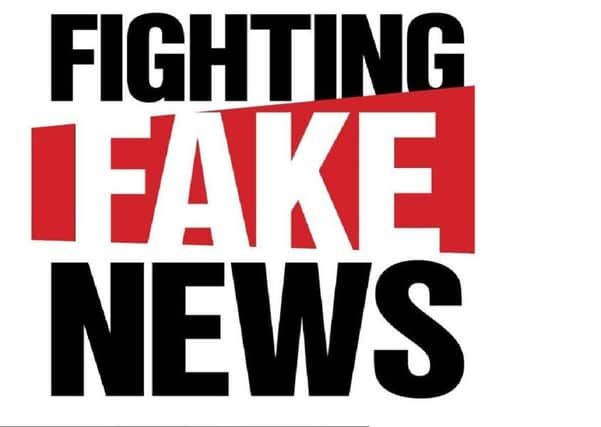FIGHTING FAKE NEWS: Advertising supports trusted local news


Advertising in your local newspaper and on its website is not just good for your business - it is the socially responsible way to support your community and to support British-based companies.
That was the message this week following the launch of the campaign to Fight Fake News.
Advertisement
Hide AdAdvertisement
Hide AdResearch shows that regional press is the most trusted of all sources of news and information and remains critical in ensuring communities are not merely kept informed of decisions that directly affect them but are also central to the debate.
Firms that advertise regularly do not merely benefit from that engaged and responsive readership - they are fundamental to ensuring that everyone can afford a copy and that quality journalism remains an intrinsic and essential part. They also know that their advertising is helping to support UK tax-paying companies.
Without any advertising, many local newspapers are likely to cost up to three times as much as they currently do. That means a price of potentially several pounds per edition, depending on the number of pages and the size of the editorial operation.
Advertising has always subsidised that figure - and price rises in recent years have been a direct result of some of that subsidy moving away, often to entirely unregulated social sites where there are no embedded checks against fake news nor professionally trained journalists.
Advertisement
Hide AdAdvertisement
Hide AdThe local press is leading a UK-wide campaign against fake news and unchecked rumour which pervades social media and unregulated international websites.
Newspapers and their websites are subject to some of the most robust regulation in the world. They and all their editorial staffs are bound by the Editors’ Code of Practice which sets out clear standards on everything from accuracy to respecting privacy and protecting children. Their regulator is the Independent Press Standards Organisation which has wide-ranging powers from insisting on corrections to launching standards inquiries and ultimately imposing fines.
Lord Justice Leveson, in his inquiry into the press, praised local and regional titles. His report described them as a much valued and important part of the British press. “It is clear to me that local, high-quality and trusted newspapers are good for our communities, our identity and our democracy and play an important social role.”
According to Local Media Works, the local marketing arm of the News Media Association (NMA), local titles like this one collectively reach 40 million people across the UK.
Advertisement
Hide AdAdvertisement
Hide AdThere are 1,000 local newspapers and 1,700 associated websites. Together they are the first port of call for 5.4 million people looking for a bargain.
Most tellingly, according to research data provided by the campaign organisers, local media is the most trusted source of information and readers are more than twice as likely to act on ads in local media than ads on TV and social media.
The NMA, which represents local, regional, and national newsbrands, this week praised the Fighting Fake News campaign launched by local titles across the UK.
NMA deputy chief executive Lynne Anderson said: “News media publishers are the best defence against fake news because they invest in high quality journalism which readers can rely on.
Advertisement
Hide AdAdvertisement
Hide AdThis in turn creates a highly trusted and engaging environment which drives real action for commercial partners.
“It is vital that we do everything we can to support original journalism and enable newspapers to continue their proud tradition of robustly holding power to account through the campaigning and investigative reporting which underpins democracy in this country.”
Throughout the 19th century, there were ongoing battles against taxes on newspapers because they were seen as ‘taxes on knowledge’ until Chancellor of the Exchequer William Gladstone abolished all such duties.
There are some who believe that as a result the press played a critical role in the spread of trusted information which was fundamental to social reform that we all take for granted.
Advertisement
Hide AdAdvertisement
Hide AdThat’s why newspapers are so proud of their advertisers. By advertising with local newspapers and websites businesses continue to do the very best for their customers and for the whole community in which they serve.
Support trusted local journalism
Our Fighting Fake News campaign is aimed at reminding our readers about the importance of our brands in bringing you Trusted News. In a world where misinformation and unsubstantiated facts can be published to huge audiences via social media platforms, with no regulation, our brands have a long and proud history of bringing you well researched and accurate journalism.
Throughout the campaign, we will be asking readers and advertisers to support us in delivering this message and to get involved in learning about how we carry out our trade.
Our campaign will also open out our journalists to check stories you may have heard about. Fact not Fiction will run throughout the campaign offering our readers the opportunity to ask our journalists to check out stories for them. We will be talking to the business community and senior people in our communities to ask them to say why they value the trusted news service we deliver every day. We have also lined up a series of politicians and celebrities who will talk about why they believe the local print industry is important for local democracy. Our plea to you today is to support this campaign, support local journalism which is under constant threat from unregulated, free and inferior content providers and to get involved with your local news publisher.